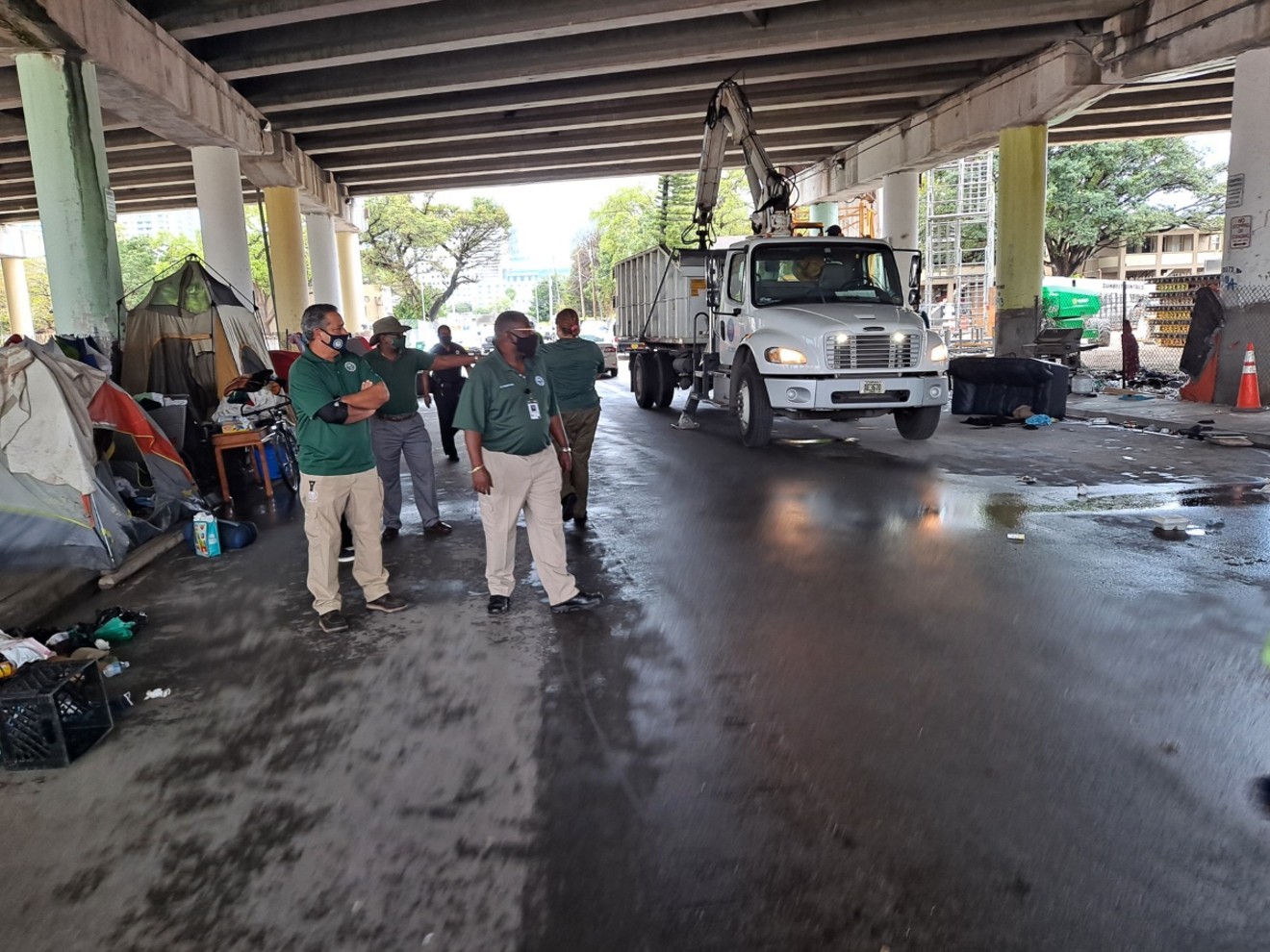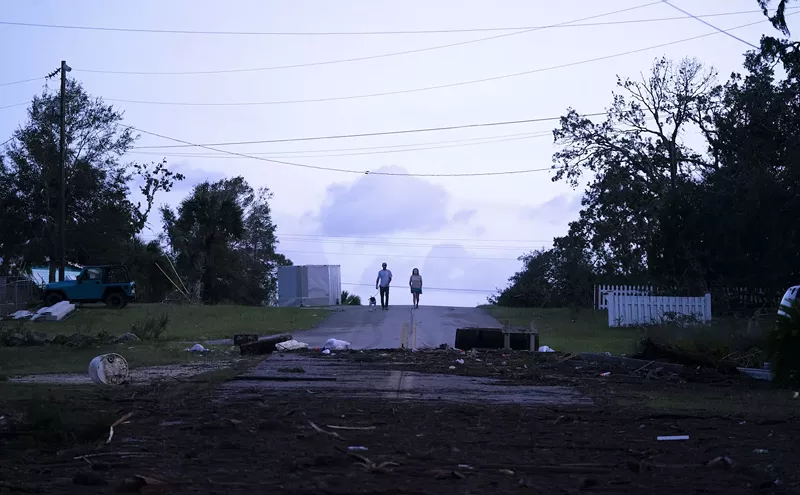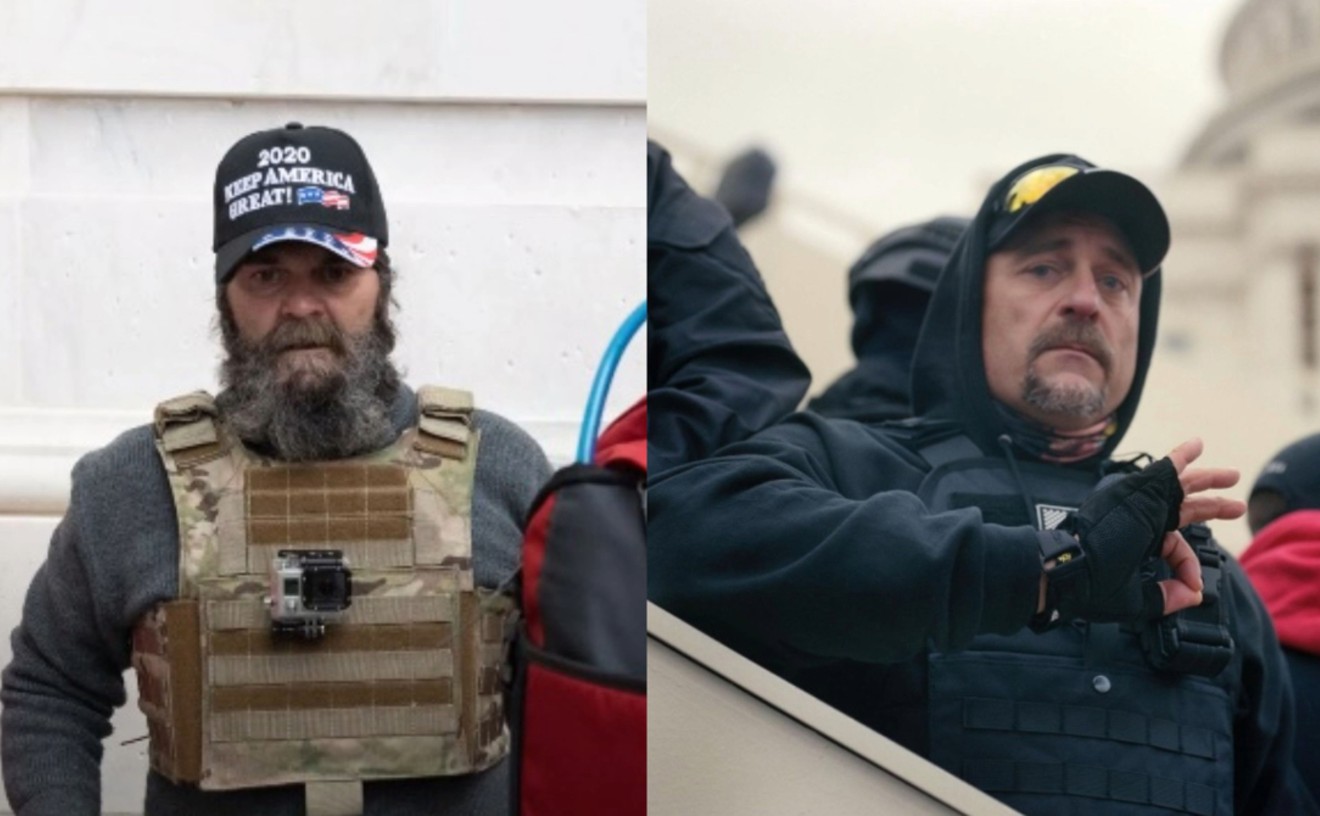"Doing that for eight months, you really start to build relationships with some of these people," Barnes tells New Times. "Every Saturday we'd go and see them and hear their stories. It was like a family."
On the morning of Saturday, February 13, the group members once again made their way to the encampment. But when they arrived, everyone was gone.
What bothered Barnes wasn't just the absence of the people she'd become accustomed to seeing — people whose trust the group gained by showing up every weekend and providing necessities. She also felt disturbed by the sight of their belongings in heaps on the sidewalk. Barnes especially worried about one man she'd come to know who used a wheelchair.
"By the time we got there, his wheelchair was on the corner," she says. "There were piles and piles of tents, food, people's clothing, their belongings."
As she subsequently learned, the City of Miami had cleared out the encampment as part of a new crackdown on people living on city streets. According to lawyers and advocates for the homeless, city staff gave the people at the 17th Street encampment an ultimatum on February 10: go to a hotel and quarantine, or go to jail.
Since at least January, commissioners have been discussing the city's "homeless problem" and demanding that service providers such as the Miami-Dade County Homeless Trust, Camillus House, and the city's own Department of Human Services do more to get people off the streets. A document titled "City of Miami Street Clean Up & Encampment Resource Plan" outlines the city's new approach and indicates that the city has been conducting sweeps of homeless encampments since last month. The document shows that cleanups took place on February 3, February 10, and February 24. Another is scheduled for this coming Wednesday, March 3.
The city's plan also says it will install ten cameras to monitor some of the encampments. The document says the purpose is to watch out for illegal dumping violations, identify "unpermitted feeders" under a city ordinance that limits public feeding of the homeless, and detect drug use and drug sales in and around encampments.
Officials with the City of Miami did not respond to several emailed requests for comment from New Times. But advocates and lawyers say they have concerns about the city's approach. Last week, the Greater Miami chapter of the American Civil Liberties Union (ACLU) sent a letter to city officials demanding an end to the "ongoing wave of cruel and destructive sweeps of homeless encampments throughout the city."
The letter stated, in part:
Eliminating all encampments would do nothing to address the City's failure to ensure an adequate supply of affordable housing. Further, at a time when police and other official violence against Blacks is under increasing scrutiny nationwide, the City cannot help but be aware that the population it is targeting and threatening with arrest is largely Black. Finally, closing encampments when the City knows that shelters (typically always full) are currently operating at reduced capacity because of Covid goes against express CDC guidance.The targeted sweeps are the result of the erosion of legal protections for the homeless in Miami. In 1998, the city reached a landmark agreement with a group of homeless Miami residents and their attorneys that established protections for those experiencing homelessness. The Pottinger agreement, as it was called, prevented officers from arresting people for engaging in "life-sustaining activities" such as sleeping outside or placing their belongings on a sidewalk, and it prohibited police from destroying unsheltered people's belongings. But the city began fighting the agreement in 2008, and in February 2019, a federal judge invalidated Pottinger.
The dissolution of the agreement opened the door for more hostile enforcement of homeless encampments, including the types of sweeps that occurred last month. The ACLU in its recent letter accused the city's outreach workers of being "rude and aggressive" during the cleanups.
"City workers seized and destroyed people’s belongings, including their tents," the letter says.
One man reported being injured when he was dragged into the street while still inside his tent, which a city worker was attempting to get rid of. According to the ACLU's letter, some people were offered hotel rooms, but they weren't given information about how long they could stay or what would happen after their hotel stay ended. (The county's Homeless Trust has partnered with hotels to provide quarantine and isolation rooms for the unsheltered.)
Rather than displacing people living on the street, the ACLU is calling on the city to provide trash cans, hand-washing stations, public toilets, and other sanitary services. The organization also decries the city's plan to install cameras to monitor the encampments.
"It's little different than having a camera in your bedroom or in your house showing where you live and what you do," says Benjamin Waxman, an ACLU attorney who helped author the letter. "As much as I don't think it's unconstitutional or illegal, it does raise concerns about government intrusion in the personal affairs of people in public. We're always concerned what the next step is in privacy invasion. I don't know that it's an effective way to accomplish the goals that the city claims the cameras are there for. I think it's a very troubling thing that we're putting cameras and surveilling people. This is just another step in that very Orwellian process."
David Peery, an attorney and advocate who once lived on Miami's streets himself, says it's wrong for city leaders to say that homelessness is an individual choice, as Commissioner Manolo Reyes indicated in a recent meeting. Peery says the fault lies with politicians for not adequately supporting affordable housing and for neglecting the city's most vulnerable.
"They’re using cleanliness and sanitation as a pretext to clean up these areas, but the unsanitary conditions in these areas are caused by the City of Miami's negligent actions," Peery maintains. "They've made a decision not to put public toilets, trash cans, or handwashing stations in these areas. So they're using the proliferation of public waste as an excuse. They go ahead and create the problem, and then cite the problems as the reason to clear the encampment. They purposely let the conditions fester and build to such a point that then they say, 'We have to do this for public safety.' It conflicts respecting people's civil rights, the integrity of their possessions, and their right to live within the city without being harassed by police."













